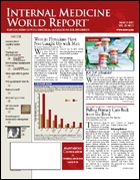Publication
Article
Internal Medicine World Report
Vioxx Comeback? New Data Show It Prevents Colorectal Adenomas Recurrence
Author(s):
Gastroenterology
Anew analysis of follow-up colonoscopy data from the study whose early results led Merck to withdraw its cyclooxygenase (COX)-2 inhibitor rofecoxib (Vioxx) from the market demonstrates that this controversial drug offers significant protection against recurrent colorectal adenomas—but at the high costs of thrombotic events and serious gastrointestinal (GI) side effects (. 2006; 131:2003-2015).
The much-discussed APPROVe (Adenomatous Polyp Prevention on Vioxx) trial that included 2587 patients with a history of colorectal adenomas was intended to investigate the benefits of rofecoxib for the prevention of adenoma recurrence compared with placebo. Follow-up colonoscopy examinations were scheduled at the end of the 1st and 3rd years of the study.
N Engl J Med
And although the study was stopped 2 months shy of its 3-year scheduled period when the increase in the incidence of cardiovascular (CV) events was becoming apparent in the rofecoxib group (. 2005; 352:1092-1102), 92% of the participants had by then had their 3-year colonoscopy done, or they had dropped out of the trial.
Adherence to the study regimen was high, with >87% of the patients taking at least 90% of their tablets during the 3rd year of the trial and >90% undergoing colonoscopies at the end of the 1st and 3rd years.
The new results reflect follow-up data that extend to year 4, when the participants had not been taking the drug for 1 year. Analysis of the 3-year treatment data showed that the rofecoxib group was significantly less likely to have adenomas compared with the placebo group, with the strongest protective effects seen during the first year (Table). The risk reduction was not influenced by gender, colon site, or use of low-dose aspirin for cardioprotection.
However, at 4 years, the relative risk for colorectal adenomas among patients who had been assigned to rofecoxib increased to 1.21, suggesting there may have been a rebound effect.
The investigators also report that the chemopreventive effect of rofecoxib may have been weaker in patients who had a history of advanced adenomas.
Referring to these results as “the last piece of the puzzle,” in an editorial in the same issue (pages 2003-2005), Patrick M. Lynch, MD, of the University of Texas, Houston, still wonders if it allows us to see the “total picture” and to consider this drug in this context.
He notes that accumulating evidence from observational and randomized trials suggests that nonsteroidal antiinflammatory drugs (NSAIDs) reduce the risk of colorectal adenoma recurrence and that the selective COX-2 inhibitors—which do not inhibit the COX-1 isoform responsible for most of the GI toxicity of the traditional nonselective NSAIDs—may be ideal candidates for colorectal chemoprevention.
The FDA has already approved the only COX-2 inhibitor now on the market, celecoxib (Celebrex), for the treatment of patients with familial adenomatous polyposis.
Based on previous results from APPROVe and the new evidence, Dr Lynch concludes:
• “Coxibs” should not be used to prevent adenomas in patients with a history of nonfamilial adenomas, because of their potential for serious CV events
• The underlying morbidity of conditions such as familial adenomatous polyposis and invasive colorectal cancer tilt the ratio toward the benefit side and favor continued treatment with coxibs and nonselective NSAIDs, although longer-term safety data in these populations are needed.
So although these new data concerning rofecoxib will likely not bring back this drug, it is encouraging that new COX-2 inhibitors are currently in clinical trials.
Key points
• NSAIDs protect against the recurrence of colorectal adenomas.
• Some evidence suggests that COX-2 inhibitors have fewer GI side effects than traditional NSAIDs, although this is still a point of disagreement.
• COX-2 inhibitors appear to have a role in patients with familial adenomatous polyposis or invasive colorectal cancer.





